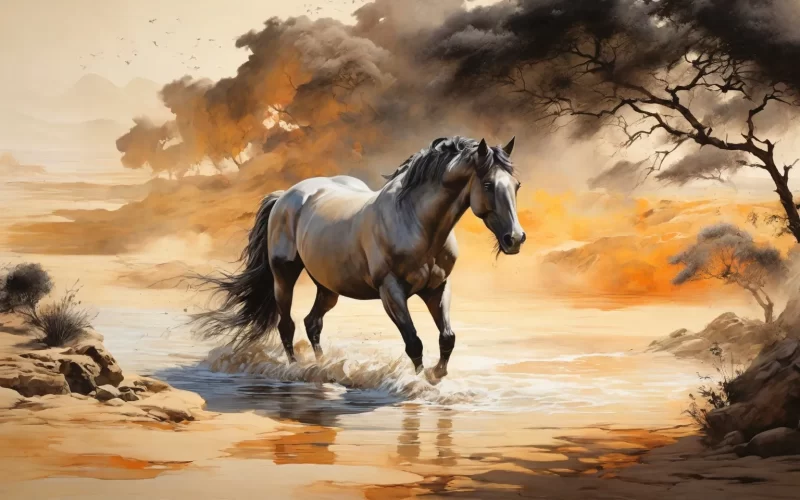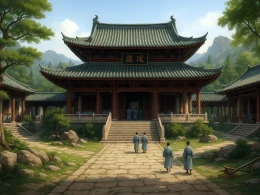Cicadas complain of thin mulberry-trees
In the Eighth-month chill at the frontier pass.
Through the gate and back again, all along the road,
There is nothing anywhere but yellow reeds and grasses
And the bones of soldiers from You and from Bing
Who have buried their lives in the dusty sand.
...Let never a cavalier stir you to envy.
With boasts of his horse and his horsemanship.
Original Poem
「塞上曲」
王昌龄
蝉鸣空桑林,八月萧关道。
出塞复入塞,处处黄芦草。
从来幽并客,皆向沙场老。
莫学游侠儿,矜夸紫骝好。
Interpretation
This poem, composed during the High Tang period, stands out among Wang Changling's frontier poems for its rare anti-war sentiment. Though renowned for his heptasyllabic quatrains and frontier themes, here the poet discards conventional glorification of military exploits, instead depicting borderlands' desolation and aged soldiers' misery with austere brushwork. Using the old Yuefu title, he warns against reckless enlistment and martial bravado. The poem's bleak profundity reveals the poet's strong pacifist stance and humanistic concern.
First Couplet: "蝉鸣空桑林,八月萧关道。"
Chán míng kōng sāng lín, bā yuè xiāo guān dào.
"Cicadas shrill in barren mulberry woods; / Eighth month on bleak-pass road where desolation broods."
The poem opens with autumn's bleak music—"cicadas" and "empty woods" establish solitude, while "eighth month" and "bleak pass" intensify the border's lifelessness. Ten characters construct a chilling frontier tableau, setting the anti-war tone.
Second Couplet: "出塞复入塞,处处黄芦草。"
Chū sài fù rù sài, chù chù huáng lú cǎo.
"Out past the wall, back in again they go; / Everywhere yellow reeds wither low."
This depicts soldiers' exhausting marches through decaying landscapes. "Yellow reeds everywhere" symbolizes both environmental harshness and war's endless depletion, adding profound desolation.
Third Couplet: "从来幽并客,皆向沙场老。"
Cóng lái yōu bīng kè, jiē xiàng shā chǎng lǎo.
"Since olden days You-Bing's stalwart sons / On battlegrounds have aged like setting suns."
Historical perspective reveals a tragic pattern: vigorous youths inevitably wither in protracted warfare. Echoing Wang Han's "how many return from ancient battles?", it pulses with compassion for conscripts' fates.
Fourth Couplet: "莫学游侠儿,矜夸紫骝好。"
Mò xué yóu xiá ér, jīn kuā zǐ liú hǎo.
"Don't imitate those wandering braves / Flaunting their purple-steeds like slaves."
The conclusion delivers satirical warning—the "wandering braves" symbolize vainglorious youths obsessed with martial theatrics. Their hollow boasts critique both societal militarism and the "frontier marquis" delusion.
Holistic Appreciation
With exceptional concision, the poem subverts typical frontier poetry's celebratory tone. Where most verses glorify battlefield heroism, Wang exposes war's human toll and soldiers' lonely decline. His lament for You-Bing's aged warriors and scorn for swaggering youths create layered anti-war rhetoric—somber yet devastating, standing unique in frontier poetry.
Artistic Merits
- Scene-emotion synthesis: Autumn imagery (cicadas, reeds) mirrors battlefield misery
- Macro-micro progression: Moves from collective destiny to individual critique
- Admonitory satire: Conveys warning through ironic contrast rather than direct condemnation
- Classical austerity: Blends Han Yuefu's directness with Jian'an style's solemnity
Insights
Beyond exposing war's cruelty and life's fragility, the poem cautions against illusory glory. In today's achievement-obsessed society, many still chase hollow "success"—this thousand-year-old frontier parable remains startlingly relevant. True aspiration requires clear-eyed assessment of costs, lest vanity consume one's essence.
Poem translator
Kiang Kanghu
About the poet

Wang Changling (王昌龄), circa A.D. 690 - 756, was a native of Xi'an, Shaanxi Province. Wang Changling's poems were mostly about the Border Places, love affairs and farewells, and he was well known during his lifetime. His seven poems are equal to those of Li Bai, and he is known as the “Master of seven lines”.












